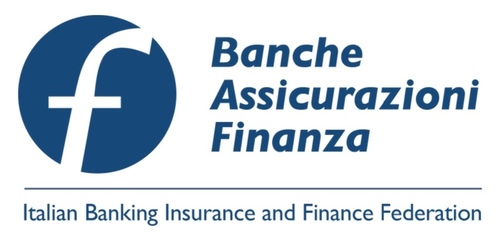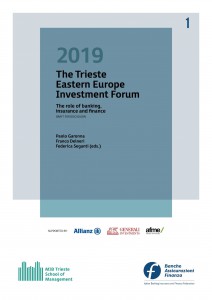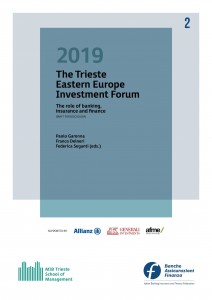
The Trieste Eastern Europe Investment Forum
The 2019 and third edition of the Trieste Eastern Europe Investment Forum (TEEIF) takes place at a turning point for Europe and the world economy. The reasons are many and relate to a set of different and interacting coordinates: geopolitical, social, institutional, regulatory and economic.
The economic outlook has improved substantially in Europe. The euro area grew in 2018 at the fastest pace in years. There are downside and upside risks, but this momentum is long-lasting. Growth is spreading to all Member States and labor market conditions are improving. One essential growth component is stability in Europe and in the neighboring countries, with a credible enlargement perspective.
On 10 July 2018 the UK hosted the Western Balkans Summit in London to build on the achievements of previous Summits – Berlin (August 2014), Vienna (August 2015), Paris (July 2016), Trieste (2017) – and to progress further in several areas of cooperation. The summit brought together the leaders of the Western Balkans countries and like-minded European partners to increase economic stability, strengthening regional security co-operation to help tackle common threats, encourage political co-operation, to help the region resolve bilateral disputes and overcome legacy issues stemming from the conflicts of the 1990s and strengthen democracy.
The inclusion of Western Balkans, with a view to consolidate and unite the continent, is a strategic investment in peace, democracy, prosperity, security and stability of Europe as a whole.
History teaches us that a secure and stable Western Balkans means a secure and stable Europe. By contrast, fragility in the Western Balkans holds risks not only for the people of the region but for everyone who calls Europe home. So it is in our shared interest to work together to increase stability and cooperation.
In order for enlargement to remain credible as a policy and EU as a policy actor in the WB region, the way enlargement is run needs to change. We are at the crossroads: process of enlargement will either accelerate until the final goal of new members joining the EU in a foreseeable future or it will lose its purpose.
Basic assumption necessary for the success of the enlargement process is that the EU sincerely wants to accept new members and that the WB sincerely wants to join the EU and fulfil membership criteria. Proposals are mostly directed to the EU institutions and EU member states since they are defining the policy, setting the dynamic and methodology of the process. WB (potential) candidates should fulfil their obligations regarding membership criteria that are already defined and well known, and not to attempt mimicking their fulfilment.
The Belgrade Security Forum, which took place from 17 to 19 October 2018, focused on these main topics:
The EU should boldly implement and reform its enlargement strategy, should demonstrate the political readiness to make enlargement functional, putting it in the center of its policy by devoting resources and funds, as it was the case in the 2004/2007 enlargement. The EC must insist on three crucial conditions that are linked to WB progress towards accession: the respect of the rule of law, further economic and social development and the advancement of regional cooperation.
Current methodology of accession negotiations became an end in itself and it is questionable whether it could lead to closing the negotiations and membership.
The EU should, in particular, devote more funds to enlargement to the Western Balkans. This increase would start with the new MFF 2021-2027, with the goal of reaching 2% of individual WB countries’ GDP in the year of their accession to the EU. The EU should extend the benefits of its internal market to the region prior to accession as much as possible.
The EU should guide the WB to gradually redirect public funds from perpetuating economic inefficiencies to supporting investments compatible with the internal market.
A credible enlargement perspective requires sustained efforts and irreversible reforms. European Commission President Jean-Claude Juncker has announced a Western Balkan accession perspective with target of accession in 2025 (although this date may only be indicative).
Banks, Insurances and financial services can play an important role in the process of integration of SEE countries in EU.
Modern developed and sophisticated banking and insurance sectors are required for encouraging domestic production, innovation, investments and trade. Banks, moreover, channeling funds and their other typical financial intermediary activities, in the initial years of transition in these countries, relied on relatively low expertise and made up a tiny share of economic activity. To the other side, insurance companies reduced the investment risk faced by private sector companies, and the state. Insurance thereby facilitates access and reduces costs of raising the capital needed by firms, particularly small and medium-sized ones. This is especially important in emerging markets, as a shortage of capital is common there and represents one of the major disincentives to investment and economic growth. By reducing the investment risk, insurance can also encourage companies to think more long-term and increase their risk absorption capacity.
The Western Balkans lack infrastructure capacity and investment – particularly in non-traditional sectors such as water, sewerage, waste, health, social affairs and education. Two important regional infrastructure investment initiatives are active in the Western Balkans: the European Western Balkans Investment Framework WBIF and the Chinese Belt and Road Initiative BRI. Both are focusing on traditional infrastructure such as energy and transport and both come with a volume of about EUR 8 billion in loans. The European initiative has in addition provided for some EUR 800 million in grants and has an emphasis on Green Economy projects.
Overall infrastructure investment needs in the region are huge. Lower bound estimates of additional investment needs only in alternative infrastructure investment for the next five years are at around EUR 800 million. The financial conditions in the region are underdeveloped but improving. Nevertheless, external debt levels have increased substantially since the outbreak of the global financial crisis and thus pose a serious threat to economic stability in a situation when the global interest rates are again on the rise.
This Trieste – FeBAF’s Forum aims is to stimulate a debate among all participants and stakeholders and to contribute to change the perspective for a Europe that is often depicted divided and fragmented.
Conference Venue
The Trieste Eastern Europe Investment Forum 2019 will take place at MIB Trieste School of Management, Largo Caduti di Nassiriya, 1
(Palazzo del Ferdinandeo), – 34142 – Trieste.


